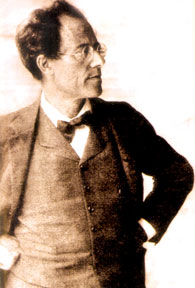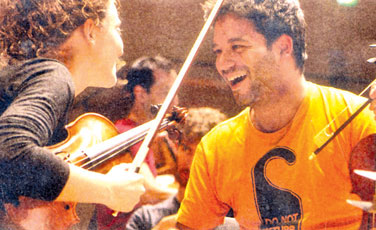The resurrection of Gustav Mahler
by Gwen Herat
There are many music lovers who are not fans of Mahler and I happen
to be in that group. But in fairness to this great composer, he is an
icon on equal terms with the rest. May be I did not study enough of
Mahler's symphonies, but I do have the capacity to sit back and enjoy
him being played which is exactly what happened at the Southbank's Royal
Festival Hall when his Symphony No. 5 came under the baton of Vladimir
Jurowski. This season Mahler was a strong favourite with many other
conductors too, who took turns to conduct the London Philharmonic
Orchestra. I also saw some of Mahler's symphonies conducted by Lovin
Maazel at the Southbank Centre.
|

Gustav Mahler whose symphonies are firm favourites with leading
orchestras around the world. This season, he is played by the
London Philharmonic Orchestra at the Royal Festival Hall and
conducted by Vladimir Jurowski. |
The virtue of Mahler was that he was passionately convinced that a
symphony must be like the world; it must contain everything. Over 100
years after his death, the capacity of his music to address his large
following, appears to be growing on and on. What may have fascinated the
listeners of his era resonates so powerfully today mixed with a seamless
enduring quality and are treasures of a timeless rush everyday.
It is the contemporary time of Mahler's music that remains eloquent.
A century gone, but the intensity of our time, is the voice that
wrestles the face of the modern world.
I do not know whether it was coincidence when I saw a woman
conducting the Royal Festival Hall for the first time. I came to know
later that it was one of the world's best. And she was Marin Also who
conducted the Orchestra of the Enlightenment and she took over, Mahler's
great Resurrection Symphony. She was perfect. She was excellent.
Masterpiece
An afternoon focusing on the great masterpiece re-imagined by the
illustrious ensemble, that made up Europe's finest young musicians, the
Resurrection Symphony was at the height of its playing status. She did
not fall short of a male conductor and was vibrant down to the last
note. That evening was the day on which I discovered Mahler and the
conducting power of a woman. Together, they pushed the boundaries of
potential in performance and the youth were in the forefront. This is in
the face of the twentieth century and beyond which has been fraught with
debate about the worth of classical music.
|

Mahler fascinates all instrumentalists who are eager to play
him. Here two such members from the LPO react to each other in
sheer joy. |
Some of the conductors felt hostility towards the last century's
works. But with great conductors such as Jurowski rescuing and
presenting the masters of that era (such as Mahler) he was able to turn
around the music scene. It is not only the LPO that is responsible, but
other major orchestras around the world contributing to throw light on
this dark situation. With its revolutions and counter-revolutions, the
major moral and philosophical upheaval have done much to bestow the
understanding of music from the point of artistic democracy.
Gustav Mahler is one such composer to emerge triumphant from this
unfair situation and since his death in 1911 and 150 years after his
death, Mahler performed with gusto around the world's leading concert
halls. Considered as the last great Romantic symphonists, his music is
accepted on the grandest scale that elaborate and convey lofty concepts
of universal art though not an innovator. Many great scholars of
classical music place Mahler as the stepping stone between Wagner and
Schoenberg. His output is very small amounting to nine acknowledged
symphonies and the song cycle, Des Knaben Wonderhorn (1892-'98).
Revival
Resurrection Symphony No. 2 in C minor (1888-'94) was revived in
1896. Many think this to be his best symphony and Mahler thinks this to
be the sequel of The Titan. This score calls for gargantuan forces
containing a pipe organ, church bells, off-stage horns and trumpets with
a strong vocal backing of a soprano, contralto and chorus.
If this score was subjected to a programmatic interpretation I would
say the first movement is about death, the second about youthful
optimism, the third about life's vulgarities and the fourth about
spiritual life and the last movement about Judgment Day. Music teachers
will term this as an allegory on the life of man. The finale is loud
enough to wake up the dead, one of the shattering climaxes in a symphony
it wraps in a thrilling end.
Talented pianist, Helene Grimaud supports Vladimir Jurowski as he
conducts the LPO to orchestrate Mahler's Symphony No. 1 The beautiful
and sensitive score in the opening chapter of his spiritual
autobiography is delicately handled by Jurowski keeping in mind the
situation under which Mahler scored the composition. The music seems to
awaken, emerging from hushed strings into its strides; marching forth,
stamping towards an eerie realisation of a nursery rhyme and arriving at
a final blazing affirmation of faith. No one, but Jurowski can translate
the hidden notes of the symphony to life the way Mahler intended.
Turning point
Jaap Van Zweden was yet another conductor who took over Mahler for
the season ably resonated by violinist, Leonidas Kavakos. His choice was
Symphony No. 6 where everything changed at the dawn of 2011 that was
Mahler's turning point where the fifth and sixth symphonies were
concerned. Disappeared were the folk tunes that dominated the earlier
four symphonies and in their place is the thrusting rhythm with a
demonic drive with an argumentative edge.
They are all heard through an empowered orchestra. The sixth is
compelling and overwhelming that was brilliantly conducted by Zweden. We
must remember that there was something untouchable about Mahler that was
indescribable, perplexing and alluring. One can read about it, but it
only really grips you with the experience felt.
His orchestras do not look different and the instruments he puts
together speak for his scores. His ensembles resound with sharp-edged
sonority that was entirely new a century ago. But they still sound
unique. Mahler pushed strikingly different moods against one another
with optimism and required the next to be an inevitable and urgent
tragedy. He played with emotion as no other composer did.
Exposed in his symphonies he expounded drama that grappled with
dreams in full view because his philosophy knew no compromise. That was
Mahler's weakness at times; sometimes, reaching for psychological
tension up to a breaking point that nearly exploded. Due to his belief
in human expressions of longing and questions, Mahler made himself clear
to reveal the touching vulnerability in us. He was right.
Any conductor will tell you that performing Mahler is not easy. The
challenges are mental and physical. That in a way was what he opted for
in his scores. For example, his Third Symphony was a sort of metaphor
for Mahler's artistic struggle. You can feel and hear that struggle in
each and every note that flows in the air when he is played in concert
halls such as today at the Royal Festival Hall. Symphony No. 6 will
vouch for its credibility though not as uprising as with the rest of his
other symphonies and the least considered for performing. |



